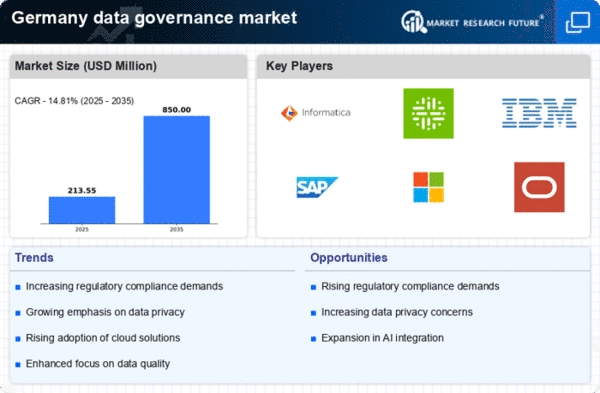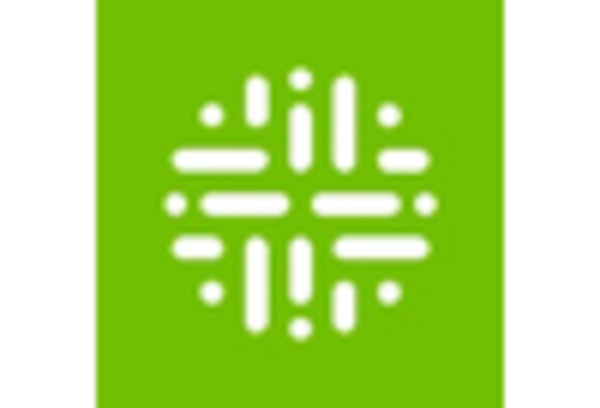Rising Data Privacy Concerns
In Germany, the increasing emphasis on data privacy is a pivotal driver for the data governance market. With the implementation of stringent regulations such as the General Data Protection Regulation (GDPR), organizations are compelled to adopt robust data governance frameworks. This regulatory landscape necessitates comprehensive data management practices to ensure compliance and mitigate risks associated with data breaches. As a result, the data governance market is projected to grow significantly, with estimates suggesting a compound annual growth rate (CAGR) of approximately 15% over the next five years. Companies are investing in advanced data governance solutions to enhance their data handling capabilities, thereby fostering trust among consumers and stakeholders.
Adoption of Cloud Technologies
The shift towards cloud computing is significantly influencing the data governance market in Germany. As organizations migrate their data to cloud environments, the need for effective governance frameworks becomes increasingly critical. Cloud-based data governance solutions offer scalability, flexibility, and enhanced security features, making them attractive to businesses. The data governance market is expected to benefit from this trend, with forecasts indicating that cloud-based solutions could account for over 50% of total data governance spending by 2027. This transition necessitates the establishment of clear policies and procedures to manage data in cloud environments, thereby driving the demand for specialized data governance tools.
Increased Focus on Data Quality
The emphasis on data quality is emerging as a critical driver for the data governance market in Germany. Organizations are recognizing that high-quality data is essential for effective decision-making and operational efficiency. Consequently, there is a growing demand for data governance solutions that facilitate data cleansing, validation, and monitoring. The data governance market is likely to expand as companies seek to implement comprehensive data quality frameworks. It is estimated that organizations that prioritize data quality can achieve up to 30% improvement in operational performance. This focus on data quality not only enhances business outcomes but also supports compliance with regulatory requirements, further propelling the data governance market.
Digital Transformation Initiatives
The ongoing digital transformation across various sectors in Germany is driving the demand for effective data governance solutions. As organizations increasingly rely on data-driven decision-making, the need for structured data management becomes paramount. The data governance market is witnessing a surge in investments, with businesses allocating substantial budgets to implement data governance frameworks that align with their digital strategies. Reports indicate that organizations are expected to spend over €1 billion on data governance technologies by 2026. This trend underscores the importance of integrating data governance into digital transformation efforts, ensuring that data remains accurate, accessible, and secure throughout its lifecycle.
Growing Importance of Data Analytics
The rising importance of data analytics in decision-making processes is a significant driver for the data governance market in Germany. Organizations are increasingly leveraging analytics to gain insights and drive strategic initiatives. However, the effectiveness of analytics is contingent upon the quality and governance of the underlying data. As a result, there is a heightened focus on implementing data governance frameworks that ensure data integrity and accessibility. The data governance market is likely to see substantial growth as companies invest in analytics-driven data governance solutions. It is projected that organizations prioritizing data governance in their analytics strategies could experience up to 25% increase in data-driven decision-making efficiency.
















